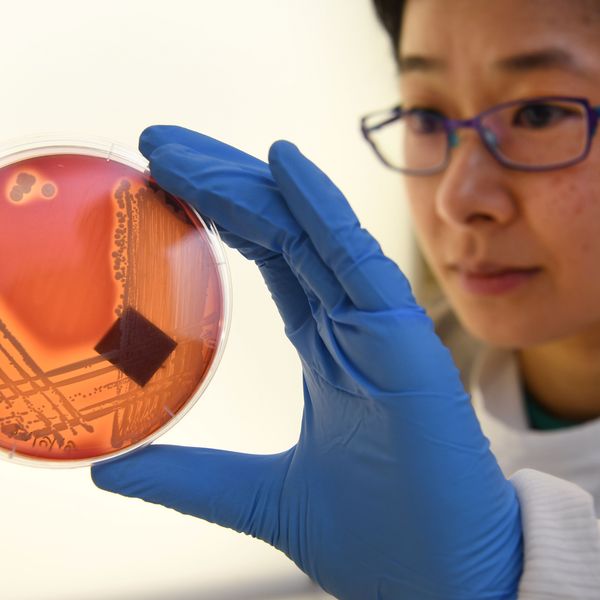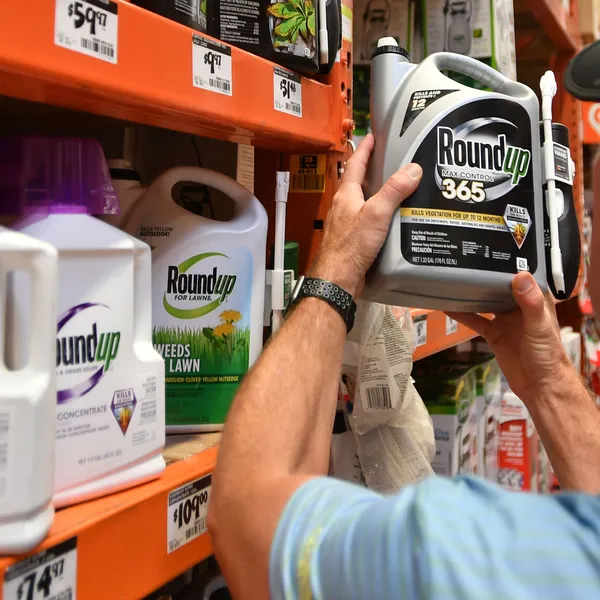New Study Reveals Yet More Risks to Bees from Controversial Pesticides
'The evidence of harm is clear,' says environmental advocacy group Friends of the Earth
Pesticides that have been banned in Europe over bee safety concerns may pose an even greater risk to pollinators than previously thought, a new report by the European Union's food safety watchdog reveals.
Neonicotinoids, or neonics, pose high risks to bees when sprayed on plant leaves, according to data by the European Food Safety Authority (EFSA) in its report, published Wednesday--which bolsters previous findings that neonics harm pollinators when used as seed treatments or granules.
The EFSA studied three pesticides in particular--clothianidin, imidacloprid, and thiamethoxam--all of which were banned by the EU in 2013 for a two-year period after scientific reports warned of their dangers. The latest findings, said Greenpeace EU agriculture policy director Marco Contiero, "confirmed what has already been demonstrated by a wealth of scientific evidence: neonicotinoids are a serious threat to bees and to the future of farming."
"The Commission should expand the EU-wide ban to cover all uses of neonicotinoids on all crops," Contiero said. "Viable non-chemical alternatives exist and the EU should encourage farmers to use them."
Jose Tarazona, head of the EFSA's pesticide unit, told the Guardian on Wednesday it is "clear that in some cases there is data suggesting high toxicity and potential risk from these substances."
Neonic use has been linked to dramatic declines in populations of pollinators like bumblebees and honey bees, as well as insects like moths, ladybirds and hoverflies, which help reduce numbers of crop pests. All bee varieties in Europe have been placed on the International Union for the Conservation of Nature's red list (pdf) of threatened species.
"Another day and yet another study shows the high risk to bees from neonicotinoid pesticides," said Paul de Zylva, senior nature campaigner at Friends of the Earth (FOE), in response to the EFSA's study.
"The evidence of harm is clear," de Zylva continued. "Questions need to be asked about how these products were ever approved for use when they were not tested for their effects on different types of bees."
Earlier this year, the United Kingdom lifted its own moratorium on pesticides to allow for some limited use of two kinds of neonics--produced by agrochemical giants Bayer and Syngenta--by farmers growing oilseed rape on roughly 300 square kilometers of land. While the repeal is temporary, giving farmers access to the pesticides for only 120 days, the move sparked outrage among environmental advocates.
Wednesday's findings "underlines why neonics are restricted and why we are challenging the Government's decision to allow use of the banned pesticides in England," de Zylva said.
An Urgent Message From Our Co-Founder
Dear Common Dreams reader, The U.S. is on a fast track to authoritarianism like nothing I've ever seen. Meanwhile, corporate news outlets are utterly capitulating to Trump, twisting their coverage to avoid drawing his ire while lining up to stuff cash in his pockets. That's why I believe that Common Dreams is doing the best and most consequential reporting that we've ever done. Our small but mighty team is a progressive reporting powerhouse, covering the news every day that the corporate media never will. Our mission has always been simple: To inform. To inspire. And to ignite change for the common good. Now here's the key piece that I want all our readers to understand: None of this would be possible without your financial support. That's not just some fundraising cliche. It's the absolute and literal truth. We don't accept corporate advertising and never will. We don't have a paywall because we don't think people should be blocked from critical news based on their ability to pay. Everything we do is funded by the donations of readers like you. Will you donate now to help power the nonprofit, independent reporting of Common Dreams? Thank you for being a vital member of our community. Together, we can keep independent journalism alive when it’s needed most. - Craig Brown, Co-founder |
Pesticides that have been banned in Europe over bee safety concerns may pose an even greater risk to pollinators than previously thought, a new report by the European Union's food safety watchdog reveals.
Neonicotinoids, or neonics, pose high risks to bees when sprayed on plant leaves, according to data by the European Food Safety Authority (EFSA) in its report, published Wednesday--which bolsters previous findings that neonics harm pollinators when used as seed treatments or granules.
The EFSA studied three pesticides in particular--clothianidin, imidacloprid, and thiamethoxam--all of which were banned by the EU in 2013 for a two-year period after scientific reports warned of their dangers. The latest findings, said Greenpeace EU agriculture policy director Marco Contiero, "confirmed what has already been demonstrated by a wealth of scientific evidence: neonicotinoids are a serious threat to bees and to the future of farming."
"The Commission should expand the EU-wide ban to cover all uses of neonicotinoids on all crops," Contiero said. "Viable non-chemical alternatives exist and the EU should encourage farmers to use them."
Jose Tarazona, head of the EFSA's pesticide unit, told the Guardian on Wednesday it is "clear that in some cases there is data suggesting high toxicity and potential risk from these substances."
Neonic use has been linked to dramatic declines in populations of pollinators like bumblebees and honey bees, as well as insects like moths, ladybirds and hoverflies, which help reduce numbers of crop pests. All bee varieties in Europe have been placed on the International Union for the Conservation of Nature's red list (pdf) of threatened species.
"Another day and yet another study shows the high risk to bees from neonicotinoid pesticides," said Paul de Zylva, senior nature campaigner at Friends of the Earth (FOE), in response to the EFSA's study.
"The evidence of harm is clear," de Zylva continued. "Questions need to be asked about how these products were ever approved for use when they were not tested for their effects on different types of bees."
Earlier this year, the United Kingdom lifted its own moratorium on pesticides to allow for some limited use of two kinds of neonics--produced by agrochemical giants Bayer and Syngenta--by farmers growing oilseed rape on roughly 300 square kilometers of land. While the repeal is temporary, giving farmers access to the pesticides for only 120 days, the move sparked outrage among environmental advocates.
Wednesday's findings "underlines why neonics are restricted and why we are challenging the Government's decision to allow use of the banned pesticides in England," de Zylva said.
Pesticides that have been banned in Europe over bee safety concerns may pose an even greater risk to pollinators than previously thought, a new report by the European Union's food safety watchdog reveals.
Neonicotinoids, or neonics, pose high risks to bees when sprayed on plant leaves, according to data by the European Food Safety Authority (EFSA) in its report, published Wednesday--which bolsters previous findings that neonics harm pollinators when used as seed treatments or granules.
The EFSA studied three pesticides in particular--clothianidin, imidacloprid, and thiamethoxam--all of which were banned by the EU in 2013 for a two-year period after scientific reports warned of their dangers. The latest findings, said Greenpeace EU agriculture policy director Marco Contiero, "confirmed what has already been demonstrated by a wealth of scientific evidence: neonicotinoids are a serious threat to bees and to the future of farming."
"The Commission should expand the EU-wide ban to cover all uses of neonicotinoids on all crops," Contiero said. "Viable non-chemical alternatives exist and the EU should encourage farmers to use them."
Jose Tarazona, head of the EFSA's pesticide unit, told the Guardian on Wednesday it is "clear that in some cases there is data suggesting high toxicity and potential risk from these substances."
Neonic use has been linked to dramatic declines in populations of pollinators like bumblebees and honey bees, as well as insects like moths, ladybirds and hoverflies, which help reduce numbers of crop pests. All bee varieties in Europe have been placed on the International Union for the Conservation of Nature's red list (pdf) of threatened species.
"Another day and yet another study shows the high risk to bees from neonicotinoid pesticides," said Paul de Zylva, senior nature campaigner at Friends of the Earth (FOE), in response to the EFSA's study.
"The evidence of harm is clear," de Zylva continued. "Questions need to be asked about how these products were ever approved for use when they were not tested for their effects on different types of bees."
Earlier this year, the United Kingdom lifted its own moratorium on pesticides to allow for some limited use of two kinds of neonics--produced by agrochemical giants Bayer and Syngenta--by farmers growing oilseed rape on roughly 300 square kilometers of land. While the repeal is temporary, giving farmers access to the pesticides for only 120 days, the move sparked outrage among environmental advocates.
Wednesday's findings "underlines why neonics are restricted and why we are challenging the Government's decision to allow use of the banned pesticides in England," de Zylva said.


